| Listing 1 - 7 of 7 |
Sort by
|
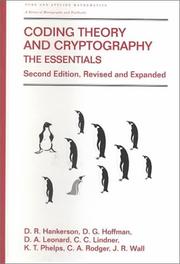
ISBN: 0824704657 9780824704650 Year: 2000 Volume: 234 Publisher: New York (N.Y.): Dekker,
Abstract | Keywords | Export | Availability | Bookmark
 Loading...
Loading...Choose an application
- Reference Manager
- EndNote
- RefWorks (Direct export to RefWorks)
Mathematical control systems --- cryptografie --- Chiffrement --- Coderingstheorie --- Codes secrets --- Codification [Théorie de ] --- Coding theory --- Correspondance secrète --- Cryptage --- Cryptanalyse --- Cryptanalysis --- Cryptografie --- Cryptographie --- Cryptography --- Cryptologie --- Cryptology --- Déchiffrement --- Décodage --- Décryptage --- Décryptement --- Lettres secrètes --- Messages cryptographiques --- Secret codes --- Secret writing --- Steganography --- Stéganographie --- Théorie de codification --- Écriture cryptographique --- Écriture secrète --- Cryptography. --- Coding theory.
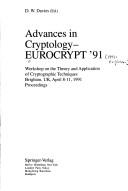
ISBN: 3540546200 0387546200 Year: 1991 Volume: 547 Publisher: Berlin New York Budapest Springer-Verlag
Abstract | Keywords | Export | Availability | Bookmark
 Loading...
Loading...Choose an application
- Reference Manager
- EndNote
- RefWorks (Direct export to RefWorks)
Chiffrement --- Codes secrets --- Correspondance secrète --- Cryptage --- Cryptanalyse --- Cryptanalysis --- Cryptografie --- Cryptographie --- Cryptography --- Cryptologie --- Cryptology --- Déchiffrement --- Décodage --- Décryptage --- Décryptement --- Lettres secrètes --- Messages cryptographiques --- Secret codes --- Secret writing --- Steganography --- Stéganographie --- Écriture cryptographique --- Écriture secrète --- Computers --- Access control --- #TELE:SISTA --- 681.3*E3 --- Data encryption: data encryption standard; DES; public key cryptosystems --- 681.3*E3 Data encryption: data encryption standard; DES; public key cryptosystems --- Cryptography. --- Computers - Access control.
Book
ISBN: 3540615172 3540687122 Year: 1996 Volume: 1100 Publisher: Berlin ; Heidelberg ; New York Springer
Abstract | Keywords | Export | Availability | Bookmark
 Loading...
Loading...Choose an application
- Reference Manager
- EndNote
- RefWorks (Direct export to RefWorks)
This book, based on the author's Ph.D. thesis, was selected during the 1995 GI Doctoral Dissertation Competition as the winning thesis in the foundations-of-informatics track. Securing integrity for digital communications in the age of global electronic information exchange and electronic commerce is vital to democratic societies and a central technical challenge for cryptologists. As core contribution to advancing the state of the art, the author develops the new class of digital fail-stop signatures. This monograph is self-contained regarding the historical background and cryptographic primitives used. For the first time, a general and sophisticated framework is introduced in which innovative fail-stop signatures are systematically presented and evaluated, from theoretical foundations to engineering aspects.
Chiffrement --- Codes secrets --- Computer security --- Computerbeveiliging --- Computers--Beveiliging --- Correspondance secrète --- Cryptage --- Cryptanalyse --- Cryptanalysis --- Cryptografie --- Cryptographie --- Cryptography --- Cryptologie --- Cryptology --- Déchiffrement --- Décodage --- Décryptage --- Décryptement --- Handtekeningen --- Informatique--Sécurité --- Lettres secrètes --- Messages cryptographiques --- Secret codes --- Secret writing --- Signaturen --- Signatures --- Signatures (Writing) --- Steganography --- Stéganographie --- Sécurité informatique --- Écriture cryptographique --- Écriture secrète --- Computer security. --- Cryptography. --- Sécurité informatique --- Computer science. --- Data encryption (Computer science). --- Computer software. --- Computer Communication Networks. --- Data Storage Representation. --- Cryptology. --- Algorithm Analysis and Problem Complexity. --- Software, Computer --- Computer systems --- Informatics --- Science --- Data encoding (Computer science) --- Encryption of data (Computer science)
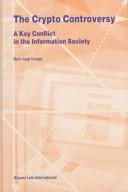
ISBN: 9041111433 9789041111432 Year: 1999 Volume: 2 Publisher: Eindhoven: ECIS,
Abstract | Keywords | Export | Availability | Bookmark
 Loading...
Loading...Choose an application
- Reference Manager
- EndNote
- RefWorks (Direct export to RefWorks)
Chiffrement --- Codes secrets --- Computer security --- Computerbeveiliging --- Computers--Beveiliging --- Correspondance secrète --- Cryptage --- Cryptanalyse --- Cryptanalysis --- Cryptografie --- Cryptographie --- Cryptography --- Cryptologie --- Cryptology --- Déchiffrement --- Décodage --- Décryptage --- Décryptement --- Informatique--Sécurité --- Lettres secrètes --- Messages cryptographiques --- Secret codes --- Secret writing --- Steganography --- Stéganographie --- Sécurité informatique --- Écriture cryptographique --- Écriture secrète --- Computer security. --- Cryptography. --- Computer privacy --- Computer system security --- Computer systems --- Computers --- Cyber security --- Cybersecurity --- Electronic digital computers --- Protection of computer systems --- Security of computer systems --- Data protection --- Security systems --- Hacking --- Signs and symbols --- Symbolism --- Writing --- Ciphers --- Data encryption (Computer science) --- Protection --- Security measures --- Theses
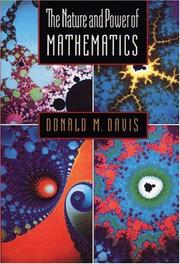
ISBN: 0691025622 0691087830 9780691025629 Year: 1993 Publisher: Princeton (N.J.): Princeton university press,
Abstract | Keywords | Export | Availability | Bookmark
 Loading...
Loading...Choose an application
- Reference Manager
- EndNote
- RefWorks (Direct export to RefWorks)
Chiffrement --- Codes secrets --- Correspondance secrète --- Cryptage --- Cryptanalyse --- Cryptanalysis --- Cryptografie --- Cryptographie --- Cryptography --- Cryptologie --- Cryptology --- Déchiffrement --- Décodage --- Décryptage --- Décryptement --- Fractales --- Fractals --- Geometry [Non-Euclidean ] --- Getaltheorie --- Géometrie non-euclidienne --- Lettres secrètes --- Meetkunde [Niet-euclidische ] --- Messages cryptographiques --- Nombres [Theorie des ] --- Number theory --- Secret codes --- Secret writing --- Steganography --- Stéganographie --- Écriture cryptographique --- Écriture secrète --- Geometry, Non-Euclidean --- Géométrie non-euclidienne --- Théorie des nombres --- Geometry, Non-Euclidean. --- Number theory. --- Fractals. --- Cryptography. --- Géométrie non-euclidienne --- Théorie des nombres --- Number study --- Numbers, Theory of --- Algebra --- Non-Euclidean geometry --- Geometry --- Parallels (Geometry) --- Fractal geometry --- Fractal sets --- Geometry, Fractal --- Sets, Fractal --- Sets of fractional dimension --- Dimension theory (Topology) --- Signs and symbols --- Symbolism --- Writing --- Ciphers --- Data encryption (Computer science) --- Foundations --- Geometry, Non-Euclidian. --- Number Theory --- Mathematiques --- Geometrie classique --- Arithmetique --- Vulgarisation
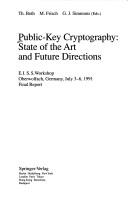
ISBN: 0387552154 3540552154 3540467807 Year: 1992 Volume: 578 Publisher: Berlin New York Springer-Verlag
Abstract | Keywords | Export | Availability | Bookmark
 Loading...
Loading...Choose an application
- Reference Manager
- EndNote
- RefWorks (Direct export to RefWorks)
This report on the state of the art and future directions of public-key cryptography is published in accordance with the terms of reference of the European Institute for System Security (EISS). The EISS was founded in 1988 by cabinet resolution of the state government of Baden-W}rttemberg and its basic task is scientific research and knowledge transfer in the field of security in telecommunications and computer and information systems. This report gives the results of an EISS workshop on public-keycryptography and contains seven chapters: an introduction, the scope of the workshop, the topics chosen, classification and description of the most prominent public-key systems, the dependence of public-key cryptography on computational number theory, mistakes and problems with public-key systems, and a projection of needs and requirements for public-key systems. It is addressed to all members of the computer science community: systems developers, researchers, decision makers, standardization committees, patent offices, and users and customers of secure computer systems.
Chiffrement --- Codes secrets --- Correspondance secrète --- Cryptage --- Cryptanalyse --- Cryptanalysis --- Cryptografie --- Cryptographie --- Cryptography --- Cryptologie --- Cryptology --- Déchiffrement --- Décodage --- Décryptage --- Décryptement --- Lettres secrètes --- Messages cryptographiques --- Secret codes --- Secret writing --- Steganography --- Stéganographie --- Écriture cryptographique --- Écriture secrète --- Computers --- Access control --- -Public key cryptography --- 681.3*E3 --- 681.3*F21 --- Asymmetric cryptography --- Public key cryptosystems --- Public key encryption --- Automatic computers --- Automatic data processors --- Computer hardware --- Computing machines (Computers) --- Electronic brains --- Electronic calculating-machines --- Electronic computers --- Hardware, Computer --- Computer systems --- Cybernetics --- Machine theory --- Calculators --- Cyberspace --- Data encryption: data encryption standard; DES; public key cryptosystems --- Numerical algorithms and problems: computation of transforms; computations infinite fields; computations on matrices; computations on polynomials; numer-theoretic computations--See also {681.3*G1}; {681.3*G4}; {681.3*I1} --- 681.3*F21 Numerical algorithms and problems: computation of transforms; computations infinite fields; computations on matrices; computations on polynomials; numer-theoretic computations--See also {681.3*G1}; {681.3*G4}; {681.3*I1} --- 681.3*E3 Data encryption: data encryption standard; DES; public key cryptosystems --- Cryptography. --- Public key cryptography --- Computer security --- Computers - Access control. --- Data encryption (Computer science). --- Computer software. --- Cryptology. --- Algorithm Analysis and Problem Complexity. --- Software, Computer --- Data encoding (Computer science) --- Encryption of data (Computer science)
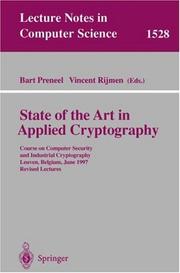
ISBN: 3540654747 3540492488 Year: 1998 Volume: 1528 Publisher: Berlin ; Heidelberg ; New York Springer Verlag
Abstract | Keywords | Export | Availability | Bookmark
 Loading...
Loading...Choose an application
- Reference Manager
- EndNote
- RefWorks (Direct export to RefWorks)
The Department of Electrical Engineering-ESAT at the Katholieke Universiteit Leuven regularly runs a course on the state of the art and evolution of computer security and industrial cryptography. The rst course took place in 1983, the second in 1989, and since then the course has been a biennial event. The course is intended for both researchers and practitioners from industry and government. It covers the basic principles as well as the most recent - velopments. Our own interests mean that the course emphasizes cryptography, but we also ensure that the most important topics in computer security are covered. We try to strike a good balance between basic theory and real-life - plications, between mathematical background and judicial aspects, and between recent technical developments and standardization issues. Perhaps the greatest strength of the course is the creation of an environment that enables dialogue between people from diverse professions and backgrounds. In 1993, we published the formal proceedings of the course in the Lecture Notes in Computer Science series (Volume 741). Since the el d of cryptography has advanced considerably during the interim period, there is a clear need to publish a new edition. Since 1993, several excellent textbooks and handbooks on cryptology have been published and the need for introductory-level papers has decreased. The growth of the main conferences in cryptology (Eurocrypt, Crypto,and Asiacrypt) shows that interest in the eld is increasing.
Chiffrement --- Codes secrets --- Computer security --- Computerbeveiliging --- Computers--Beveiliging --- Correspondance secrète --- Cryptage --- Cryptanalyse --- Cryptanalysis --- Cryptografie --- Cryptographie --- Cryptography --- Cryptologie --- Cryptology --- Déchiffrement --- Décodage --- Décryptage --- Décryptement --- Informatique--Sécurité --- Lettres secrètes --- Messages cryptographiques --- Secret codes --- Secret writing --- Steganography --- Stéganographie --- Sécurité informatique --- Écriture cryptographique --- Écriture secrète --- Computer security. --- Cryptography. --- Computer Science --- Engineering & Applied Sciences --- Academic collection --- 681.3*E3 --- 681.3*D46 --- 681.3*F21 --- 681.3*C2 --- 681.3*J1 --- Signs and symbols --- Symbolism --- Writing --- Ciphers --- Data encryption (Computer science) --- Computer privacy --- Computer system security --- Computer systems --- Computers --- Electronic digital computers --- Security of computer systems --- Data protection --- Security systems --- Hacking --- Data encryption: data encryption standard; DES; public key cryptosystems --- Security and protection: access controls; authentication; cryptographic controls; information flow controls; security kernels; verification (Operating systems) --- Numerical algorithms and problems: computation of transforms; computations infinite fields; computations on matrices; computations on polynomials; numer-theoretic computations--See also {681.3*G1}; {681.3*G4}; {681.3*I1} --- Computer communication networks: data communications; OSI; security and protection --- Administrative data processing (Computer applications) --- Security measures --- 681.3*J1 Administrative data processing (Computer applications) --- 681.3 *C2 Computer communication networks: data communications; OSI; security and protection --- 681.3*F21 Numerical algorithms and problems: computation of transforms; computations infinite fields; computations on matrices; computations on polynomials; numer-theoretic computations--See also {681.3*G1}; {681.3*G4}; {681.3*I1} --- 681.3*D46 Security and protection: access controls; authentication; cryptographic controls; information flow controls; security kernels; verification (Operating systems) --- 681.3*E3 Data encryption: data encryption standard; DES; public key cryptosystems --- Cyber security --- Cybersecurity --- Sécurité informatique --- Protection of computer systems --- Protection --- Computer science. --- Information technology. --- Business --- Computer communication systems. --- Operating systems (Computers). --- Data encryption (Computer science). --- Management information systems. --- Computer Science. --- Systems and Data Security. --- Data Encryption. --- Management of Computing and Information Systems. --- Operating Systems. --- Computer Communication Networks. --- IT in Business. --- Data processing. --- Computer-based information systems --- EIS (Information systems) --- Executive information systems --- MIS (Information systems) --- Sociotechnical systems --- Information resources management --- Management --- Data encoding (Computer science) --- Encryption of data (Computer science) --- Computer operating systems --- Disk operating systems --- Systems software --- Communication systems, Computer --- Computer communication systems --- Data networks, Computer --- ECNs (Electronic communication networks) --- Electronic communication networks --- Networks, Computer --- Teleprocessing networks --- Data transmission systems --- Digital communications --- Electronic systems --- Information networks --- Telecommunication --- Cyberinfrastructure --- Electronic data processing --- Network computers --- IT (Information technology) --- Technology --- Telematics --- Information superhighway --- Knowledge management --- Informatics --- Science --- Communication systems --- Operating systems --- Distributed processing --- 681.3 *C2 --- Information Systems. --- Cryptology. --- Business—Data processing.
| Listing 1 - 7 of 7 |
Sort by
|

 Search
Search Feedback
Feedback About UniCat
About UniCat  Help
Help News
News